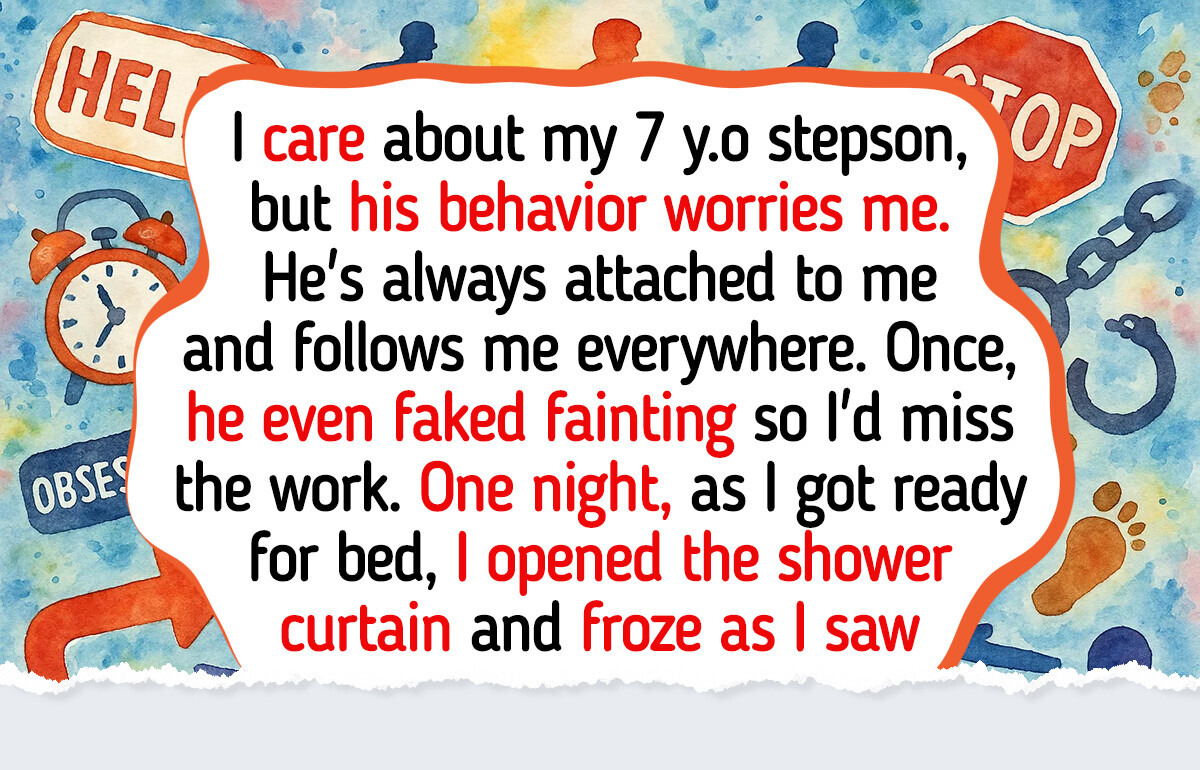I would definitely get him evaluated by a professional child psychologist. There’s definitely something off
My Stepson’s Behavior Scares Me — but His Mom Refuses to See the Truth

In blended families, stepparents may encounter situations where a child becomes overly attached or acts out in unusual ways, making patience, clear boundaries, and professional support essential for maintaining a balanced and nurturing household.
Billie’ letter:
Hey Bright Side!
I have this amazing stepson, from my current marriage, he’s 7. I care about him a lot, but his behavior worries me. It feels like he’s attached to me 24/7. I mean, the kid literally follows me everywhere. Once, he even faked fainting just so I’d miss work. I was floored.
But last night that took it to another level. I was getting ready for bed, just minding my own business, and I opened the shower curtain, and froze. There he was, crouched inside, completely silent, just staring at me. I swear, he wasn’t saying a word, wasn’t moving, just... waiting.
When I told him it was late and he needed to go to sleep, he finally whispered, “I want to stay here with you.” I tried to explain to my wife that this isn’t normal. That maybe he needs some kind of professional help, therapy, or at least someone to talk to about his attachment.
She brushed it off. “He just loves you,” stuff like that. I get it, she loves him and wants to protect him, but I can’t shake the feeling that something’s off. I don’t want to be that overreactive step-parent, but I also don’t want to ignore this if it’s serious.
So... Bright Side, am I overreacting here? Or should I push harder for some help? How would you handle a situation like this?
Thank you in advance,
Billie.

That kid needs help ASAP by a schrink. That is NOT a normsl behavior.
Thank you so much for sharing your story with us, Billie. We really tried to gather some pieces of advice that might help, and your openness made that possible. Your experience matters, and we hope these suggestions give you a little guidance and support.
- Try to create small boundaries, slowly — You can start with tiny steps: “It’s shower time, I need five minutes to myself.” No yelling, no guilt-tripping. Kids often respond better to predictable routines than lectures. Boundaries aren’t mean, they’re structure.
- Seek support outside the household — You don’t need to figure this alone. Talk to a friend, a parent group, or even online communities for step-parents. Venting, comparing experiences, or just hearing “me too” can make the stress feel manageable.
- Celebrate the little wins — Every time he shows a small step toward healthy attachment, reading alone, playing by himself, respecting your space, notice it. It reminds you that progress exists even if the scary moments grab all the attention.
With the right support and understanding, these challenges can become opportunities for stronger bonds and personal growth. By noticing patterns and seeking guidance when needed, families can create a healthier, happier environment for everyone.
Comments
Related Reads
20+ Dads Who Prove That Actions Speak Louder Than Words

15 Stories That Prove Some Memories Are Impossible to Delete

I Refuse to Help My Pregnant Sister, and I Don’t Feel Guilty

I Refuse to Return My Late Colleague’s Paycheck, Now His Widow Is Furious

My MIL Tried to Humiliate Me at the Altar—By Morning, She Wasn’t Laughing

My Manager Tried to Destroy My Career but a Work Argument Showed Them the Truth

I Charged My MIL for Christmas Dinner, Even Though She’s Always Helped Us for Free

I Won’t Sacrifice My Last Good Years Because My Son Refuses to Grow Up

I Turned Down a Promotion and Got Fired—My Revenge Was Brutal

20+ Moments That Prove Quiet Kindness Is the Only Language Everyone Speaks

10 Hospital Workers Who Prove Kind Heart Is a Powerful Medicine

10 Dating Stories That Started Like Rom-Coms but Ended Like Horror Movies




